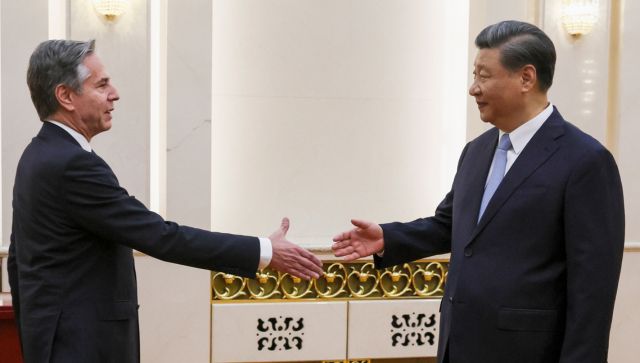US Secretary of State Antony Blinken met Chinese President Xi Jinping as he concluded his two-day visit to Beijing on Monday. The visit was however not confirmed before Blinken arrived at the Chinese capital. This shows the signs of the talks going well. It is further being expected that this visit by Blinken will pave the way for the meeting between President Biden and his Chinese counterpart this November. In a meeting that lasted approximately 35 minutes, the Chinese President correctly said that the world needed a “generally stable” China-US relation. The closely watched trip of the US diplomat also included meetings with top Chinese diplomat Wang Yi and foreign minister Qin Gang. Blinken, for his part, has said that he agreed with Chinese leadership on the need to “stabilise” relations, but he was “clear-eyed about the challenges” China poses. Blinken also kept a firm stance on “de-risking and diversifying” economic engagement with China, a stance recently adopted by G7 in its Hiroshima summit. Most importantly, on the Taiwan question, Blinken has said that the US does not support the independence of Taiwan and upholds the “one China” policy, but is concerned about China’s “provocative actions” along the Taiwan Strait. With this, Blinken has become the highest US official to visit China ever since President Biden has assumed the office. And, the way Biden has praised him, saying, “he did hell of a job”, and stating that the relationship between the two nations is on the “right trail”, it appears that the trip has been fruitful for the US. This clearly shows an apparent ‘thaw’ in the relations that has soured in the recent years on account of issues ranging from trade, Chinese assertion in South China Sea, Beijing’s aggressive stance on Taiwan, and its growing influence in the Indo-Pacific. The concern over national security and espionage went to the extent of having a ‘spy’ balloon-saga. Certainly, the situation seems to have evolved out to be better than a few months ago. According to CNBC, on the Chinese side the top-diplomat Wang Yi asserted that the difficulties in the US-China ties lies in the “erroneous perception of China, which leads to wrong policies.” Wang further asked the US to lift up sanctions and not to suppress China’s technological development. China policy of the US shows a duality of interests, on one hand, Washington conceptualises itself as a super-power, world’s biggest military spender, spending $877 billion dedicated to the military in 2022, as compared to $292 billion by China, as per Statista. As per this perception, the US is naturally averse to the growing assertion of China in global politics, especially in the strategically important Indo-Pacific. The ‘integrated deterrence’ policy, which involves the formation of the AUKUS (Australia, Britain, and the US) agreement, the Quadrilateral Security Dialogue, ‘close friendship’ with India, ‘remilitarization’ of Japan, and wooing Philippines, among others, is a product of this stance to contain China’s expansion in this region. On the other hand, it realises the dominance China has on supply chains and the geostrategic clout the east Asian nation enjoys. Apart from this, trade amounting to $690.6 billion, which hit the record high last year, is too big to brush aside. “The new figures show that US imports from China increased to $536.8bn last year as American shoppers spent more on Chinese-made goods, including toys and mobile phones. In the same period, US exports to China increased to $153.8bn,” reported BBC. This is despite the fact that the two countries have been in a ‘trade war’ since 2018. Besides this, on issues of “tragedy of the commons” like climate change, the US requires China’s support to allay its global role and burden. Further, this high-level meeting has come after several American business leaders have visited China in recent months, the list includes Elon Musk (CEO, Tesla and SpaceX), Jamie Dimon (CEO of JPMorgan) and Tim Cook (CEO, Apple). Also recently, Xi has called Bill Gates “an old friend” and said he hoped they could cooperate in a way that would benefit both China and the United States. This was the Chinese President’s first meeting with a foreign entrepreneur in years, reported Reuters. As per CNBC, upon seeing Wang, Blinken “underscored the importance of responsibly managing the competition between the United States and the PRC [People’s Republic of China] through open channels of communication to ensure competition does not veer into conflict.” But how far this competition will be healthy for the world, for the parties involved, and for the inherent conflicts that already exist or may arise, has to be seen. Yet, this visit at least shows that both powers have realised that cooperation, to the extent possible, is more yielding than confrontation, given the weight both economic and geopolitical giants have in the global order. Read all the Latest News , Trending News , Cricket News , Bollywood News , India News and Entertainment News here. Follow us on Facebook, Twitter and Instagram.
Antony Blinken’s China visit and meeting with Xi Jinping at least show that both powers have realised that cooperation, to the extent possible, is more yielding than confrontation, given the weight both economic and geopolitical giants have in the global order
Advertisement
End of Article
Written by Vimal Harsh
Sub Editor, Opinion desk, Firstpost, Network18 see more


)

)
)
)
)
)
)
)
)



